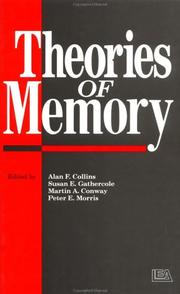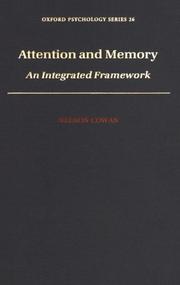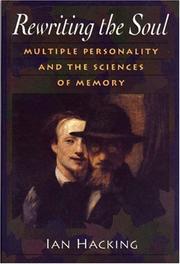| Listing 1 - 4 of 4 |
Sort by
|
Book
ISBN: 9035104285 Year: 1988 Publisher: Amsterdam : Bakker,
Abstract | Keywords | Export | Availability | Bookmark
 Loading...
Loading...Choose an application
- Reference Manager
- EndNote
- RefWorks (Direct export to RefWorks)
159.953 --- 930.85 --- 930.85 Cultuurgeschiedenis. Kultuurgeschiedenis --- Cultuurgeschiedenis. Kultuurgeschiedenis --- 159.953 Geheugen. Herinnering --- Geheugen. Herinnering --- Cognitive psychology --- 130.2 --- Fludd Robert --- Bruno Giordano --- Camillo Giulio --- renaissance --- middeleeuwen --- oudheid --- hersens --- brein --- kennisleer --- Hogere geestelijke functies --- Mnemonics --- Humans --- Memory (Mental processes) --- Memory (Mental processes). --- 415.4 --- geheugen --- geschiedenis --- psychologie --- 159.9 --- onderwijs --- literatuur --- cultuurfilosofie --- History. --- History of civilization

ISBN: 0863772900 9780863772900 9780863773464 086377346X Year: 1993 Publisher: Hove (Sussex): Erlbaum, Lawrence, Associates,
Abstract | Keywords | Export | Availability | Bookmark
 Loading...
Loading...Choose an application
- Reference Manager
- EndNote
- RefWorks (Direct export to RefWorks)
Theories of Memory brings together some of the most influential researchers currently working in the area of memory. Individual chapters cover a wide range of key areas of memory research, but throughout the book the main emphasis is on theoretical issues, how they relate to existing empirical work and what implications they have for future work in the area. Topics covered include: the development of different memory abilities, the case for different subsystems in memory, and the structure of different memory subsystems. Different views on the level of explanation offered by our theories of memory are discussed. Not only do the contributions reveal diversity in the theoretical concerns within memory research, they also illustrate a considerable range in the type of evidence that is brought to bear on these concerns. The diversity within the book reflects the vigour of modern research into memory and shows how it continues to be an important research area. Theories of Memory provides a unique state-of-the-art perspective on this key aspect of cognitive psychology.
Cognitive psychology --- Memory (Mental processes) --- Memory --- Humans --- Awareness. --- Consciousness. --- Memory. --- Mémoire (philosophie). --- Mémoire. --- Rappel (psychologie). --- Physiology. --- Mémoire --- physiology. --- Retention (Psychology) --- Intellect --- Psychology --- Thought and thinking --- Comprehension --- Executive functions (Neuropsychology) --- Mnemonics --- Perseveration (Psychology) --- Reproduction (Psychology)

ISBN: 0195067606 9780195067606 9786610529766 0195344251 1280529768 0198023227 1429401443 Year: 1995 Volume: no. 26 Publisher: New York Oxford Oxford University Press Clarendon Press
Abstract | Keywords | Export | Availability | Bookmark
 Loading...
Loading...Choose an application
- Reference Manager
- EndNote
- RefWorks (Direct export to RefWorks)
Attention and Memory brings together and assesses past and present research on information processing, to formulate a model of this entire system.
Aandacht --- Aandacht [Psychologie] --- Attention --- Attention [Psychologie] --- Attention [Psychology] --- Concentration --- Forgetfulness --- Geheugen --- Human information processing --- Informatiestroom--Verwerking door de mens --- Information [Traitement de l'] chez l'homme --- Memory --- Mémoire --- Oubli --- Retention (Psychology) --- Traitement de l'information chez l'homme --- Vergeten --- Mental Processes. --- Memory. --- Attention. --- Human information processing. --- Information, Traitement de l', chez l'homme --- Intellect --- Psychology --- Thought and thinking --- Comprehension --- Executive functions (Neuropsychology) --- Mnemonics --- Perseveration (Psychology) --- Reproduction (Psychology) --- Information processing, Human --- Bionics --- Information theory in psychology --- Perception --- Concentration (Psychology) --- Flow (Psychology) --- Apperception --- Arousal (Physiology) --- Educational psychology --- Distraction (Psychology) --- Interest (Psychology) --- Experimentele psychologie --- geheugen en aandacht --- geheugen en aandacht. --- Mémoire --- Humans --- Memory (Mental processes)

ISBN: 1400811937 1282752235 9786612752230 1400821681 069105908X 069103642X 9781400821686 9780691059082 9780691036427 1400803268 Year: 1995 Publisher: Princeton, N.J. Princeton University Press
Abstract | Keywords | Export | Availability | Bookmark
 Loading...
Loading...Choose an application
- Reference Manager
- EndNote
- RefWorks (Direct export to RefWorks)
Twenty-five years ago one could list by name the tiny number of multiple personalities recorded in the history of Western medicine, but today hundreds of people receive treatment for dissociative disorders in every sizable town in North America. Clinicians, backed by a grassroots movement of patients and therapists, find child sexual abuse to be the primary cause of the illness, while critics accuse the “MPD” community of fostering false memories of childhood trauma. Here the distinguished philosopher Ian Hacking uses the MPD epidemic and its links with the contemporary concept of child abuse to scrutinize today’s moral and political climate, especially our power struggles about memory and our efforts to cope with psychological injuries.What is it like to suffer from multiple personality? Most diagnosed patients are women: why does gender matter? How does defining an illness affect the behavior of those who suffer from it? And, more generally, how do systems of knowledge about kinds of people interact with the people who are known about? Answering these and similar questions, Hacking explores the development of the modern multiple personality movement. He then turns to a fascinating series of historical vignettes about an earlier wave of multiples, people who were diagnosed as new ways of thinking about memory emerged, particularly in France, toward the end of the nineteenth century. Fervently occupied with the study of hypnotism, hysteria, sleepwalking, and fugue, scientists of this period aimed to take the soul away from the religious sphere. What better way to do this than to make memory a surrogate for the soul and then subject it to empirical investigation? Made possible by these nineteenth-century developments, the current outbreak of dissociative disorders is embedded in new political settings. Rewriting the Soul concludes with a powerful analysis linking historical and contemporary material in a fresh contribution to the archaeology of knowledge. As Foucault once identified a politics that centers on the body and another that classifies and organizes the human population, Hacking has now provided a masterful description of the politics of memory : the scientizing of the soul and the wounds it can receive.
Memory -- Social aspects. --- Multiple personality -- History. --- Multiple personality -- Philosophy. --- Multiple personality -- Social aspects. --- Soul -- Psychological aspects. --- Multiple personality --- Memory --- Soul --- Learning --- Dissociative Disorders --- Humanities --- Mental Processes --- Mental Disorders --- Psychiatry and Psychology --- Psychological Phenomena and Processes --- Philosophy --- Multiple Personality Disorder --- Psychiatry --- Health & Biological Sciences --- Psychiatric Disorders, Individual --- Social aspects --- History --- Psychological aspects --- Philosophy. --- Social aspects. --- History. --- Psychological aspects. --- Pneuma --- Alternating personality --- Consciousness, Multiple --- DID (Personality disorder) --- Dissociated personality --- Dissociative identity disorder --- Double consciousness --- Double personality --- Dual personality --- MPD (Personality disorder) --- Multiple consciousness --- Multiple identity disorder --- Multiple personalities --- Multiple personality disorder --- Personality, Multiple --- Split personality --- Retention (Psychology) --- -Multiple personality --- Dissociative disorders --- -Future life --- Future life --- Philosophical anthropology --- Theological anthropology --- Animism --- Spirit --- Intellect --- Psychology --- Thought and thinking --- Comprehension --- Executive functions (Neuropsychology) --- Mnemonics --- Perseveration (Psychology) --- Reproduction (Psychology) --- Cognitive psychology --- Multiple Persönlichkeit --- Gedächtnis --- Seele --- Philosophie --- Humans --- Memory (Mental processes) --- Human beings
| Listing 1 - 4 of 4 |
Sort by
|

 Search
Search Feedback
Feedback About UniCat
About UniCat  Help
Help News
News